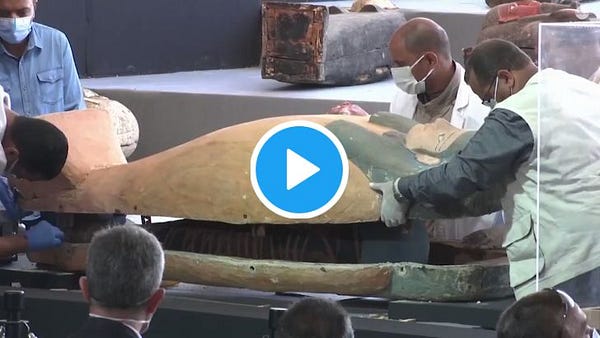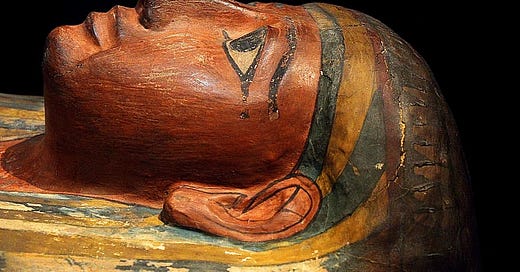🌍 Inside The Middle East — Nov. 18
Jordan Election, Egypt Discovers 100 Mummies, Assad 50th Anniversary, al-Qaeda No. 2 Reportedly Dead, U.S. Troop Removal and Bahrain PM Dies
Happy Wednesday folks! Welcome to another edition of Inside The Middle East where we dissect the most important news from the world’s most important region.
Today we’ll traverse several countries including Jordan where women and hardline Islamists suffered most in the country’s election; Egypt where 100 ancient coffins containing mummies were discovered; Syria who are marking the 50th anniversary of the House of Assad; Iran whose government have rejected claims the U.S. and Israel assassinated al-Qaeda’s No. 2; Iraq and Afghanistan where we have official numbers and dates for Trump’s troop removal; and Bahrain where the world’s longest-serving prime minister has passed away.
No podcast this week, instead we had a good old Election Dissection of Belize, Myanmar and Moldova, so be sure to check that out the same way Walter does every week. Thank you Walter 🙏

Next week we’ll have either Olga Khazan or Josh Morgerman on the podcast, so be sure to keep an eye out for that. Until then, let’s get to the Middle East. Aina, take it away…
Job Corner
We added 230 new jobs to the board over the weekend, taking us up to 980! Next week we’ll aim to eclipse that magical 1,000 mark. In the meantime, help out by spreading the word. 🙏
Data Corner
Most Wanted: Data on U.S. most wanted and other missing persons, from the FBI.
Refugees: Data finder on 79.5 million displaced people globally, from the UN.
Jordan Election
We start this week in Jordan where pro-government candidates will form the majority of the country’s new lower house of parliament, in an election marred by low turnout of just 30 percent amid the pandemic. Jordan is generally more representative than most countries in the region, with all government and senate members appointed by King Abdullah II. But of the 130 seats up for election, women won just 15, the minimum amount required, down from 20 in 2016. There were also losses for the main opposition Islamic Action Front, which is linked to the Muslim Brotherhood, and saw its total seats slashed from 15 to 10.
There had been pressure to cancel the vote leading up to election day, in a country where Covid cases and deaths have soared in recent days, and where a four-day lockdown was issued immediately after polls closed. The country has already suffered greatly from a loss of vital tourism revenue, and the poverty rate has risen to 16 percent.

Egypt Discovers 100 Ancient Coffins With Mummies Inside
Egypt also voted over the past week, but we’ll save our summary for when the results are officially released. In the meantime, about 100 coffins buried over 2,500 years ago have been found south of Cairo. The tombs date back to the Ptolemaic dynasty that ruled Egypt for about 300 years around 320BC. The find is just the latest in a recent series of discoveries, including at least 140 coffins found since September, most with mummies inside. The country’s tourism and antiquities minister said the artefacts would be moved to museums across Egypt.


Support Independent Journalism
Hey there, if you’ve enjoyed today’s newsletter and Inside the Middle East, please consider supporting us so we can continue delivering you the most important news from the most important region. 🙏
Assad 50th Anniversary
Next up is Syria where this week marks the 50th anniversary of Hafez Al-Assad overthrowing president Nur al-Din al-Atasi in a military coup. The country has been ruled by the Assad family ever since, under Hafez until his death in 2000, and then under his son and current President Bashar.
Hafez saw Syria through multiple wars with its neighbours, and transformed the afterthought of a country into a regional power, but did so through repression, rejection of compromise and brutal bloodshed. Bashar, on the other hand, began his tenure with the Damascus Spring, a period of hope of reform. But by the summer of 2001, Bashar fiercely cracked down on dissent, a legacy he’s continued ever since.
When you think of all the bloody feuds Syria has had with the likes of Israel, Iraq, Lebanon, the Muslim Brotherhood, and then of course it’s devastating civil war that started in 2011 and has seen 600,000 people killed and a quarter of the population flee the country, it’s truly astonishing how the House of Assad remains in control.
50 years of Assad: Anniversary of Syrian ruling family's grab for power
U.S. and Israel Reportedly Kill al-Qaeda No.2
We move to Iran next where it’s become apparent that the U.S. and Israel worked together in August to assassinate al-Qaida’s No. 2 in command, Abu Mohammed al-Masri and his daughter Miriam, the widow of Osama bin Laden’s son Hamza. Al-Masri is believed to have been the mastermind behind the deadly 1998 bombings of U.S. embassies in East Africa, and was reportedly gunned down in a Tehran alley on the anniversary of the embassy attacks this summer. But in a remarkable twist, Iran has rejected claims that al-Masri was killed, and Iranian news media identified the victims as a Lebanese history professor and his daughter, Maryam.
Last Time on Inside The Middle East…
🌍 Inside The Middle East — November 11
🌍 Inside The Middle East — November 5
🌍 Inside The Middle East — October 28
🌍 Inside The Middle East — October 21
U.S. Military Anticipates Official Withdrawal
Iraq and Afghanistan are up next where the U.S. military is anticipating an official order from Donald Trump to withdraw further troops. Trump’s October tweets that all troops would return home by Christmas took military officials by surprise. Former defense secretary Mark Esper, who was fired by Trump earlier this month, managed to send a memo before he left warning conditions for removal had yet to be met, and doing so could endanger the Taliban peace deal.
The administration aims to cut the number of troops in Afghanistan from 4,500 to 2,500, and in Iraq from 3,000 to 2,500, just five days before Trump is due to leave office in January. Afghanistan has been dealing with a renewed surge of violence with recent attacks targeting journalists, university students, and a government checkpoint last week.
Bahrain Prime Minister Dies
We end today in Bahrain where Prime Minister Prince Khalifa bin Salman Al Khalifa has died aged 84. Prince Khalifa took office in 1971 after Bahrain gained independence from the UK, and was the world’s longest-serving prime minister. Khalifa’s Sunni royal family has ruled the gulf island since 1783, and his power and wealth can be seen everywhere. His legacy might be remembered for surviving the 2011 Arab Spring, led by the country’s Shia majority that called for the removal of several royal members. Since then, Khalifa continued to clamp down on any dissent.
That’s it for today. See you on Friday for Picks of the Week! 👋




